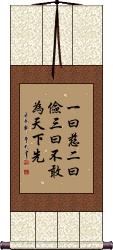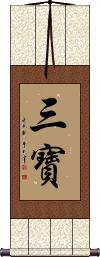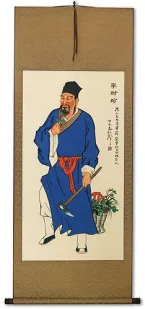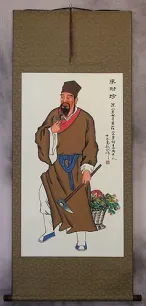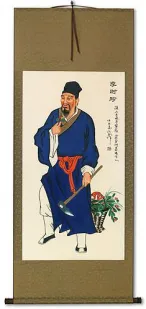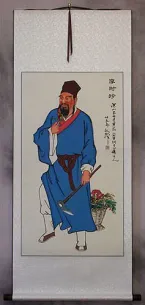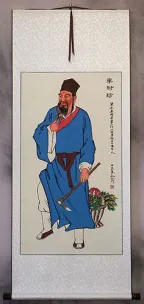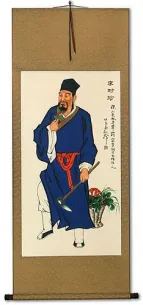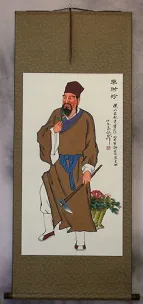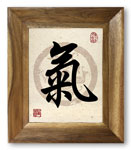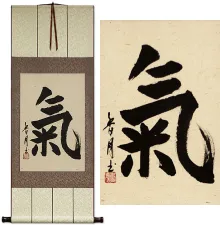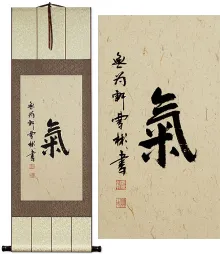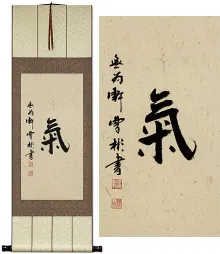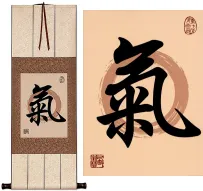Many custom options...
And formats...

Jing Qi Shen in Chinese / Japanese...
Buy a Jing Qi Shen calligraphy wall scroll here!
Personalize your custom “Jing Qi Shen” project by clicking the button next to your favorite “Jing Qi Shen” title below...
Three Treasures of Chinese Medicine
精, 氣, 神 are the characters jing, qi, and shen.
As a set, these three characters are known in English as the treasures of traditional Chinese medicine, the treasures of Qi Gong, or the three treasures of Taoism / Daoism.
Sometimes this set is titled 三寶 (sānbǎo) or “three treasures,” but here, we're writing each treasure out.
Here's how these characters are perceived in this context...
Jing: nutritive essence; refined; perfected; pure
Qi: vitality; energy; force; breath; vigor
Shen: spirit; soul; mind; being
To keep it simple, you can use “essence, vitality, and spirit” to define these.
Daodejing / Tao Te Ching - Excerpt
Excerpt from Chapter 67
一曰慈二曰儉三曰不敢為天下先 is an excerpt from the 67th Chapter of Lao Tzu's (Lao Zi's) Te-Tao Ching (Dao De Jing).
This is the part where the three treasures are discussed. In English, we'd say these three treasures are compassion, frugality, and humility. Some may translate these as love, moderation, and lack of arrogance. I have also seen them translated as benevolence, modesty, and “Not presuming to be at the forefront in the world.” You can mix them up the way you want, as translation is not really a science but rather an art.
I should also explain that the first two treasures are single-character ideas, yet the third treasure was written out in six characters (there are also some auxiliary characters to number the treasures).
If Lao Tzu's words are important to you, then a wall scroll with this passage might make a great addition to your home.
Three Treasures of Buddhism
The Triple Gem
三寶 is the title for “Three Precious Treasures of Buddhism” or “The Triple Gem.”
These three treasures are the Buddha 佛, the Dharma 法 (teachings or the law of the Buddha), and the Sangha 僧 (the community of monks or followers).
This term is used by most (perhaps not all) Buddhists in China, Japan, and South Korea (written the same in the original form but pronounced differently in each language). Non-Buddhists may just read this as “Three Treasures” without the religious context. For instance, there is also a “Three Treasures of Chinese Medicine” that is sometimes titled the same way.
In modern Japanese and Simplified Chinese, this is written 三宝 instead of 三寶.
Take Refuge in the Three Treasures
Take Refuge in the Three Treasures
This in-stock artwork might be what you are looking for, and ships right away...
Gallery Price: $200.00
Your Price: $79.88
Shen Nong
Divine Farmer
Oriental Wall Scroll
Discounted Blemished
Gallery Price: $58.00
Your Price: $32.00
Gallery Price: $200.00
Your Price: $79.88
Decorative Shen Nong
Divine Farmer Art Wall Scroll
Discounted Blemished
Gallery Price: $63.00
Your Price: $35.00
Gallery Price: $31.00
Your Price: $16.88
Gallery Price: $300.00
Your Price: $109.88
Gallery Price: $106.00
Your Price: $58.77
Gallery Price: $106.00
Your Price: $58.77
Gallery Price: $90.00
Your Price: $49.88
Not the results for jing qi shen that you were looking for?
Below are some entries from our dictionary that may match your jing qi shen search...
| Characters If shown, 2nd row is Simp. Chinese |
Pronunciation Romanization |
Simple Dictionary Definition |
三宝 see styles |
sanpou / sanpo さんぽう |
More info & calligraphy: Three Treasures of Buddhism |
三寶 三宝 see styles |
sān bǎo san1 bao3 san pao sanbou / sanbo さんぼう |
More info & calligraphy: Three Treasures of Buddhism(surname) Sanbou three treasures |
南無三寶 南无三宝 see styles |
nán wú sān bǎo nan2 wu2 san1 bao3 nan wu san pao namu sanbō |
More info & calligraphy: Take Refuge in the Three Treasures |
歸依三寶 归依三宝 see styles |
guī yī sān bǎo gui1 yi1 san1 bao3 kuei i san pao kie sanbō |
More info & calligraphy: Take Refuge in the Three Treasures |
三寳 三宝 see styles |
sān bǎo san1 bao3 san pao sanbō |
Triratna, or Ratnatraya, i.e. the Three Precious Ones: 佛 Buddha, 法 Dharma, 儈 Saṅgha, i.e. Buddha, the Law, the Ecelesia or Order. Eitel suggests this trinity may be adapted from the Trimūrti, i.e, Brahma, Viṣṇu, and Sīva. The Triratna takes many forms, e.g. the Trikāya 三身 q.v. There is also the Nepalese idea of a triple existence of each Buddha as a Nirvāṇa-Buddha, Dhyāni-Buddha, and Mānuṣi-Buddha; also the Tantric trinity of Vairocana as Nirvāṇa-Buddha, Locana according to Eitel "existing in reflex in the world of forms", and the human Buddha, Śākyamuni. There are other elaborated details known as the four and the six kinds of triratna 四 and 六種三寳, e.g. that the Triratna exists in each member of the trinity. The term has also been applied to the 三仙 q.v. Popularly the 三寳 are referred to the three images in the main hall of monasteries. The centre one is Śākyamuni, on his left Bhaiṣajya 藥師 and on his right Amitābha. There are other explanations, e.g. in some temples Amitābha is in the centre, Avalokiteśvara on his left, and Mahāsthāmaprāpta or Mañjuśrī on his right. Table of Triratna, Trikāya, and Trailokya: — DHARMASAṄGHABUDDHAEssential BodhiReflected BodhiPractical BodhiDhyāni BuddhaDhyāni BodhisattvaMānuṣī BuddhaDharmakāyaSambhogakāyaNirmāṇakāyaPurityCompletenessTransformations4th Buddha-kṣetra3rd Buddha-kṣetra1st and 2nd Buddha kṣetraArūpadhātuRūpadhātuKāmadhātu. |
齋筵 斋筵 see styles |
zhāi yán zhai1 yan2 chai yen |
Offerings of food to the triratna. |
三寶物 三宝物 see styles |
sān bǎo wù san1 bao3 wu4 san pao wu san bōmotsu |
The things appertaining to the triratna, i.e. to the Buddha— temples and images, etc.; to the dharma— the scriptures; to the saṅgha— cassock, bowl, etc. |
三寶種 三宝种 see styles |
sān bǎo zhǒng san1 bao3 zhong3 san pao chung sanbō shu |
seeds of the three treasures |
誹謗戒 诽谤戒 see styles |
fěi bàng jiè fei3 bang4 jie4 fei pang chieh hihō kai |
precept forbidding the denigrate [of the three treasures] |
謗三寶 谤三宝 see styles |
bàng sān bǎo bang4 san1 bao3 pang san pao hō sanbō |
denigrating the three treasures |
一體三寶 一体三宝 see styles |
yī tǐ sān bǎo yi1 ti3 san1 bao3 i t`i san pao i ti san pao ittai no sanbō |
In the one body of the saṅgha is the whole triratna, Buddha, Dharma, and saṅgha. Also, Mind, Buddha, and the living, these three are without differentiation, 心佛與衆生是三無差別, i.e. are all one. |
三寶功德 三宝功德 see styles |
sān bǎo gōng dé san1 bao3 gong1 de2 san pao kung te sanbō kudoku |
merit of the three treasures |
三寶寺刹 三宝寺刹 see styles |
sān bǎo sì chà san1 bao3 si4 cha4 san pao ssu ch`a san pao ssu cha sanbō jisetsu |
temples of the three treasures |
三寶荒神 三宝荒神 see styles |
sān bǎo huāng shén san1 bao3 huang1 shen2 san pao huang shen Sanbō Kōjin |
wild deity of the three treasures |
同體三寳 同体三寳 see styles |
tóng tǐ sān bǎo tong2 ti3 san1 bao3 t`ung t`i san pao tung ti san pao dōtai sanbō |
idem 一體三寳. |
歸依方便 归依方便 see styles |
guī yī fāng biàn gui1 yi1 fang1 bian4 kuei i fang pien kie hōben |
trust (in the three treasures) |
歸命三寶 归命三宝 see styles |
guī mìng sān bǎo gui1 ming4 san1 bao3 kuei ming san pao kimyō sanbō |
to commit oneself to the three treasures |
自性三寶 自性三宝 see styles |
zì xìng sān bǎo zi4 xing4 san1 bao3 tzu hsing san pao jishō sanbō |
The triratna, each with its own characteristic, Buddha being wisdom 覺; the Law correctness 正; and the Order purity 淨. |
致敬三寶 致敬三宝 see styles |
zhì jìng sān bǎo zhi4 jing4 san1 bao3 chih ching san pao chikyō sanbō |
making obeisance to the three treasures |
謗三寶戒 谤三宝戒 see styles |
bàng sān bǎo jiè bang4 san1 bao3 jie4 pang san pao chieh hō sanbō kai |
One of the commandments against speaking falsely of the Three Precious Ones. |
三寶大荒神 三宝大荒神 see styles |
sān bǎo dà huāng shén san1 bao3 da4 huang1 shen2 san pao ta huang shen Sanbōdai kōjin |
wild deity of the three treasures |
助謗三寶戒 助谤三宝戒 see styles |
zhù bàng sān bǎo jiè zhu4 bang4 san1 bao3 jie4 chu pang san pao chieh johō sanbō kai |
precept forbidding the denigrate of the three treasures |
毀謗三寶戒 毁谤三宝戒 see styles |
huǐ bàng sān bǎo jiè hui3 bang4 san1 bao3 jie4 hui pang san pao chieh kihō sanbō kai |
precept forbidding the denigrate of the three treasures |
The following table may be helpful for those studying Chinese or Japanese...
| Title | Characters | Romaji (Romanized Japanese) | Various forms of Romanized Chinese | |
| Three Treasures of Chinese Medicine | 精氣神 精气神 | jīng qì shén jing1 qi4 shen2 jing qi shen jingqishen | ching ch`i shen chingchishen ching chi shen |
|
| Daodejing Tao Te Ching - Excerpt | 一曰慈二曰儉三曰不敢為天下先 一曰慈二曰俭三曰不敢为天下先 | yī yuē cí èr yuē jiǎn sān yuē bù gǎn wéi tiān xià xiān yi1 yue1 ci2 er4 yue1 jian3 san1 yue1 bu4 gan3 wei2 tian1 xia4 xian1 yi yue ci er yue jian san yue bu gan wei tian xia xian | i yüeh tz`u erh yüeh chien san yüeh pu kan wei t`ien hsia hsien i yüeh tzu erh yüeh chien san yüeh pu kan wei tien hsia hsien |
|
| Three Treasures of Buddhism | 三寶 三宝 | san bou / sanbou / san bo | sān bǎo / san1 bao3 / san bao / sanbao | san pao / sanpao |
| Take Refuge in the Three Treasures | 南無三寶 南无三宝 | na mu san bou namusanbou na mu san bo | nán mo sān bǎo nan2 mo san1 bao3 nan mo san bao nanmosanbao | nan mo san pao nanmosanpao |
| Take Refuge in the Three Treasures | 歸依三寶 归依三宝 | ki e san bou kiesanbou ki e san bo | guī yī sān bǎo gui1 yi1 san1 bao3 gui yi san bao guiyisanbao | kuei i san pao kueiisanpao |
| In some entries above you will see that characters have different versions above and below a line. In these cases, the characters above the line are Traditional Chinese, while the ones below are Simplified Chinese. | ||||
Successful Chinese Character and Japanese Kanji calligraphy searches within the last few hours...

